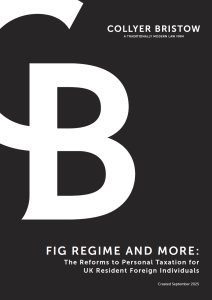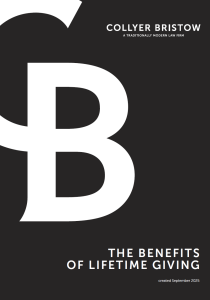
The Team
Our lawyers have the expertise and experience to provide you with creative, personalised solutions in a clear and understandable way.
Our Publications
Discover a wealth of invaluable guidance in the form of guides and brochures written by our expert lawyers.
Our insights
Discover the latest insights and thought leadership from our team of legal experts.
About
What Are Lifetime Gifts?
Lifetime giving can be fraught with difficulties and it is essential to consider the options available to the donor. When making lifetime gifts, it is important to take into account the personal circumstances of both the donor and donee. A gift should not be made to the detriment of the donor and likewise, the exact nature of the gift and its tax implications for all parties should be considered carefully.
Is there a UK gift tax on lifetime gifts?
There is no separate lifetime gift tax in the UK. Depending on the circumstances, lifetime gifts can create an inheritance tax liability either at the time or when the person making the gift dies. For an example of how lifetime gifts can have inheritance tax implications, and how these rules compare to gifts made in the US, please see our articles on normal expenditure out of income and US/UK giving.
Gifting Money To Family: How much can you gift tax-free in the UK to children, family members, or friends?
An individual can gift up to £325,000 in a seven-year period without having to worry about inheritance tax on their death. Even for outright gifts in excess of this, there will be no inheritance tax to pay at the time, and if the donor survives the gift by seven years there will be no inheritance tax liability on their death. For more information on gifts to family members, please see our articles on gifting up a generation.
Gifting A House: What are the tax implications of gifting a house?
This will depend on the circumstances and whether you intend to live in the house, but there could typically be inheritance tax and capital gains tax consequences. For more information, please see our articles on how do I help my children buy a house, can I gift my holiday home or rental property to my children, and can I gift my home to my children and still live in it.
Gifting Businesses: How can I gift a business or business assets?
Business assets can be gifted like anything else, but there are specific tax rules that should be considered. For more information, please see our article on how to efficiently gift business assets.
Gifts Out Of Income: Is there an effective way to make gifts out of income?
The rules for “normal expenditure out of income” mean such gifts can be very effective from an inheritance tax perspective. For more information, please see our article on normal expenditure out of income.
Transferring property into a trust: What are the benefits of transferring property into a trust in the UK?
This will depend on the circumstances and what you are trying to achieve, but trusts can offer a degree of control and some tax benefits. For examples of where trusts might be a useful way to provide for family members, please see our articles on [trusts and school fees], and the exposure of women to inheritance tax.
How should I approach charitable giving?
There are numerous benefits of charitable giving and it should be approached carefully to ensure that any such benefits are optimised. Please see our articles How should I approach charitable giving? and The Giving Pledge, and our podcast The Fine Art of Probate: Gifts and legacies
Can attorneys make gifts using a Lasting Power of Attorney?
Attorneys have limited powers to make gifts under a Lasting Power of Attorney. Please see our article Gifts and Lasting Powers of Attorney (LPAs)
What are the benefits of gifting art?
There are tax benefits of gifting art during your lifetime using the Cultural Gift Scheme or on death by way of the Acceptance in Lieu Scheme. Please see our articles Gifting in the Arts (CGS v AIL) and [CB Probate: Acceptance in Lieu]
How do I make gifts to a disabled child and/or a vulnerable person?
Making a gift to a disabled or vulnerable person must be considered carefully for their own benefit as well as for tax purposes. Please see our article gifting to vulnerable individuals.
What do I need to think about when making a gift with overseas elements?
Such gifts can be more complex, for instance, if the recipient or the assets are based outside the UK, and therefore need to be considered carefully. Please see our articles on foreign gifts and US/UK giving.
Peter DanielPartner - Head of Private Wealth
+44 20 7468 7351+44 7879 842645peter.daniel@collyerbristow.com
Caroline HollisChartered Legal Executive (FCILEx)
Charles AvensPartner - Head of Immigration
+44 20 7468 7234 +44 7778 309 594charles.avens@collyerbristow.com
Quick glance: publications
- FIG Regime and more: The Reforms to Personal Taxation for UK Resident Foreign IndividualsWhat the new rules mean for UK resident foreign taxpayers - What the new rules mean for UK resident foreign taxpayers
- The Benefits Of Lifetime GivingAn expert guide to tax-efficient charitable giving - An expert guide to tax-efficient charitable giving
- Estate planning for digital assets
- Planning with crypto assets
- Private Wealth services
- Lifetime Giving Handbook
- Lifetime Giving | Trusts and School FeesA guide to tax efficient arrangements - A guide to tax efficient arrangements
Lifetime Giving FAQs Publications
FIG Regime and more: The Reforms to Personal Taxation for UK Resident Foreign IndividualsWhat the new rules mean for UK resident foreign taxpayers - What the new rules mean for UK resident foreign taxpayers
From 6 April 2025, UK tax for foreign residents is based solely on tax residence, not domicile. The simplified system affects income, capital gains, and inheritance tax, offering some residents up to four years to shelter non-UK income and gains.
The Benefits Of Lifetime GivingAn expert guide to tax-efficient charitable giving - An expert guide to tax-efficient charitable giving
At Collyer Bristow, we help individuals, families, and trustees plan strategically to maximise the impact of their charitable giving while preserving and protecting wealth. Charitable donations, whether made during your lifetime or through your Will, can provide significant opportunities to reduce tax liabilities and create a lasting legacy.
Our latest guide, The Benefits of Lifetime Giving, explores the full range of options available and illustrates how to integrate charitable donations into a broader estate planning strategy.
Estate planning for digital assets
Fundamentally, digital assets are the possessions you access on a digital device. These assets are normally stored online and accessed via a personal online account run by a third-party provider. How should you manage these assets?
Planning with crypto assets
It is increasingly important for individuals to understand how crypto assets are taxed, both in life and on death, and ensure the consideration of crypto assets in succession planning.
Private Wealth services
An overview of our Private Wealth services for individuals and families based in the UK and overseas.
Lifetime Giving Handbook
We have prepared a handbook to answer the most pressing and common lifetime giving questions and issues including; giving property to the next generation, gifts to vulnerable individuals, how best to fulfil an individual’s philanthropic ambitions, foreign gifts and the tax benefits associated with gifts of art.
Lifetime Giving | Trusts and School FeesA guide to tax efficient arrangements - A guide to tax efficient arrangements
Many families contend with paying school fees running into hundreds of thousands of pounds per child over the course of their education. This guide examines some tax efficient arrangements that other family members (typically grandparents) can use to contribute to these costs.
Lifetime Giving FAQs insights
News
Government Introduces ‘Mansion Tax’ Surcharge on Properties Over £2mGovernment Introduces ‘Mansion Tax’ Surcharge on Properties Over £2m
Read more
Podcasts
The Anson Case and How the UK Really Taxes LLCs with James Austen and Henry LopesThe Anson Case and How the UK Really Taxes LLCs with James Austen and Henry Lopes
Listen now
Shorter Reads
IHT on UK farming land and buildings held through offshore companiesIHT on UK farming land and buildings held through offshore companies
Read more
News
Autumn Budget 2025Autumn Budget 2025
Read more
Shorter Reads
HMRC Loan Schemes: A New Settlement Approach for Individuals Caught Up in Disguised Remuneration (Autumn Budget 2025)HMRC Loan Schemes: A New Settlement Approach for Individuals Caught Up in Disguised Remuneration (Autumn Budget 2025)
Read more
Podcasts
Investing for Children in the US UK Space with Patrick MulhernInvesting for Children in the US UK Space with Patrick Mulhern
Listen now
Shorter Reads
Renters’ Rights Bill: Key Considerations for Landlords Looking to Sell or Regain PossessionRenters’ Rights Bill: Key Considerations for Landlords Looking to Sell or Regain Possession
Read more
Longer Reads
Lessons from Angela Rayner’s SDLT errorsLessons from Angela Rayner’s SDLT errors
Read more
Podcasts
Living in America as a Brit: Opportunities, Pitfalls & Planning First with Richard TaylorLiving in America as a Brit: Opportunities, Pitfalls & Planning First with Richard Taylor
Listen now
Podcasts
US Tax Residency Demystified: Citizens, Green Cards & the Substantial Presence Test with Alicea CastellanosUS Tax Residency Demystified: Citizens, Green Cards & the Substantial Presence Test with Alicea Castellanos
Listen now
Podcasts
Understanding the FIG Regime: A New Era for US-UK Taxation with Joshua MossUnderstanding the FIG Regime: A New Era for US-UK Taxation with Joshua Moss
Listen now
News
Collyer Bristow Recognised in Chambers High Net Worth 2025 GuideCollyer Bristow Recognised in Chambers High Net Worth 2025 Guide
Read more
Need some more information? Make an enquiry below
Lifetime Giving FAQs key contacts
- Peter
DanielPartner - Head of Private Wealth
Talk to Peter about UK trusts, tax & estate planning, International trusts, tax & estate planning, Private wealth, Probate and US/UK Tax & estate planning
Lifetime Giving FAQs
Making gifts during your lifetime is an efficient way to reduce the value of your estate for inheritance tax purposes as well as providing benefits for your family. Managing the succession of personal and family assets is often at the forefront for many individuals’ minds and thus lifetime giving is very much the cornerstone of any successful tax and estate plan.
The Team
Our lawyers have the expertise and experience to provide you with creative, personalised solutions in a clear and understandable way.
Our Publications
Discover a wealth of invaluable guidance in the form of guides and brochures written by our expert lawyers.
Our insights
Discover the latest insights and thought leadership from our team of legal experts.
What Are Lifetime Gifts?
Lifetime giving can be fraught with difficulties and it is essential to consider the options available to the donor. When making lifetime gifts, it is important to take into account the personal circumstances of both the donor and donee. A gift should not be made to the detriment of the donor and likewise, the exact nature of the gift and its tax implications for all parties should be considered carefully.
Is there a UK gift tax on lifetime gifts?
There is no separate lifetime gift tax in the UK. Depending on the circumstances, lifetime gifts can create an inheritance tax liability either at the time or when the person making the gift dies. For an example of how lifetime gifts can have inheritance tax implications, and how these rules compare to gifts made in the US, please see our articles on normal expenditure out of income and US/UK giving.
Gifting Money To Family: How much can you gift tax-free in the UK to children, family members, or friends?
An individual can gift up to £325,000 in a seven-year period without having to worry about inheritance tax on their death. Even for outright gifts in excess of this, there will be no inheritance tax to pay at the time, and if the donor survives the gift by seven years there will be no inheritance tax liability on their death. For more information on gifts to family members, please see our articles on gifting up a generation.
Gifting A House: What are the tax implications of gifting a house?
This will depend on the circumstances and whether you intend to live in the house, but there could typically be inheritance tax and capital gains tax consequences. For more information, please see our articles on how do I help my children buy a house, can I gift my holiday home or rental property to my children, and can I gift my home to my children and still live in it.
Gifting Businesses: How can I gift a business or business assets?
Business assets can be gifted like anything else, but there are specific tax rules that should be considered. For more information, please see our article on how to efficiently gift business assets.
Gifts Out Of Income: Is there an effective way to make gifts out of income?
The rules for “normal expenditure out of income” mean such gifts can be very effective from an inheritance tax perspective. For more information, please see our article on normal expenditure out of income.
Transferring property into a trust: What are the benefits of transferring property into a trust in the UK?
This will depend on the circumstances and what you are trying to achieve, but trusts can offer a degree of control and some tax benefits. For examples of where trusts might be a useful way to provide for family members, please see our articles on [trusts and school fees], and the exposure of women to inheritance tax.
How should I approach charitable giving?
There are numerous benefits of charitable giving and it should be approached carefully to ensure that any such benefits are optimised. Please see our articles How should I approach charitable giving? and The Giving Pledge, and our podcast The Fine Art of Probate: Gifts and legacies
Can attorneys make gifts using a Lasting Power of Attorney?
Attorneys have limited powers to make gifts under a Lasting Power of Attorney. Please see our article Gifts and Lasting Powers of Attorney (LPAs)
What are the benefits of gifting art?
There are tax benefits of gifting art during your lifetime using the Cultural Gift Scheme or on death by way of the Acceptance in Lieu Scheme. Please see our articles Gifting in the Arts (CGS v AIL) and [CB Probate: Acceptance in Lieu]
How do I make gifts to a disabled child and/or a vulnerable person?
Making a gift to a disabled or vulnerable person must be considered carefully for their own benefit as well as for tax purposes. Please see our article gifting to vulnerable individuals.
What do I need to think about when making a gift with overseas elements?
Such gifts can be more complex, for instance, if the recipient or the assets are based outside the UK, and therefore need to be considered carefully. Please see our articles on foreign gifts and US/UK giving.
Peter DanielPartner - Head of Private Wealth
View Peter Daniel's profileAbbie ArmstrongAssociate
View Abbie Armstrong's profileAidan GrantPartner
View Aidan Grant's profileCameron CreesAssociate
View Cameron Crees's profileCarly RussellPartner
View Carly Russell's profileCaroline HollisChartered Legal Executive (FCILEx)
View Caroline Hollis's profileCharles AvensPartner - Head of Immigration
View Charles Avens's profileCharlie FowlerPartner
View Charlie Fowler's profileDaniel SimonSenior Partner
View Daniel Simon's profileEmily MalvasoSenior Associate
View Emily Malvaso's profileGeorgina CraneSenior Associate
View Georgina Crane's profileHenry LopesAssociate
View Henry Lopes's profileIsobel RudgeAssociate
View Isobel Rudge's profileIzel UzunParalegal
View Izel Uzun's profileJames AustenPartner
View James Austen's profileJohn SanerPartner
View John Saner's profileKathy AllsoTrust Manager
View Kathy Allso's profileRachel PangAssociate
View Rachel Pang's profileRoger WoolfeConsultant
View Roger Woolfe's profileSamara DuttonPartner
View Samara Dutton's profileTulin Kiranoglu HamitPartner
View Tulin Kiranoglu Hamit's profileLifetime Giving FAQs Publications
- FIG Regime and more: The Reforms to Personal Taxation for UK Resident Foreign IndividualsWhat the new rules mean for UK resident foreign taxpayers - What the new rules mean for UK resident foreign taxpayers
- The Benefits Of Lifetime GivingAn expert guide to tax-efficient charitable giving - An expert guide to tax-efficient charitable giving
- Estate planning for digital assets
- Planning with crypto assets
- Private Wealth services
- Lifetime Giving Handbook
- Lifetime Giving | Trusts and School FeesA guide to tax efficient arrangements - A guide to tax efficient arrangements
Lifetime Giving FAQs insights
News
Government Introduces ‘Mansion Tax’ Surcharge on Properties Over £2mGovernment Introduces ‘Mansion Tax’ Surcharge on Properties Over £2m
Read more
Podcasts
The Anson Case and How the UK Really Taxes LLCs with James Austen and Henry LopesThe Anson Case and How the UK Really Taxes LLCs with James Austen and Henry Lopes
Listen now
Shorter Reads
IHT on UK farming land and buildings held through offshore companiesIHT on UK farming land and buildings held through offshore companies
Read more
News
Autumn Budget 2025Autumn Budget 2025
Read more
Shorter Reads
HMRC Loan Schemes: A New Settlement Approach for Individuals Caught Up in Disguised Remuneration (Autumn Budget 2025)HMRC Loan Schemes: A New Settlement Approach for Individuals Caught Up in Disguised Remuneration (Autumn Budget 2025)
Read more
Podcasts
Investing for Children in the US UK Space with Patrick MulhernInvesting for Children in the US UK Space with Patrick Mulhern
Listen now
Shorter Reads
Renters’ Rights Bill: Key Considerations for Landlords Looking to Sell or Regain PossessionRenters’ Rights Bill: Key Considerations for Landlords Looking to Sell or Regain Possession
Read more
Longer Reads
Lessons from Angela Rayner’s SDLT errorsLessons from Angela Rayner’s SDLT errors
Read more
Podcasts
Living in America as a Brit: Opportunities, Pitfalls & Planning First with Richard TaylorLiving in America as a Brit: Opportunities, Pitfalls & Planning First with Richard Taylor
Listen now
Podcasts
US Tax Residency Demystified: Citizens, Green Cards & the Substantial Presence Test with Alicea CastellanosUS Tax Residency Demystified: Citizens, Green Cards & the Substantial Presence Test with Alicea Castellanos
Listen now
Podcasts
Understanding the FIG Regime: A New Era for US-UK Taxation with Joshua MossUnderstanding the FIG Regime: A New Era for US-UK Taxation with Joshua Moss
Listen now
News
Collyer Bristow Recognised in Chambers High Net Worth 2025 GuideCollyer Bristow Recognised in Chambers High Net Worth 2025 Guide
Read more
Need some more information? Make an enquiry below.
Message us on WhatsApp (calling not available)
Please note that Collyer Bristow provides this service during office hours for general information and enquiries only and that no legal or other professional advice will be provided over the WhatsApp platform. Please also note that if you choose to use this platform your personal data is likely to be processed outside the UK and EEA, including in the US. Appropriate legal or other professional opinion should be taken before taking or omitting to take any action in respect of any specific problem. Collyer Bristow LLP accepts no liability for any loss or damage which may arise from reliance on information provided. All information will be deleted immediately upon completion of a conversation.
Close































